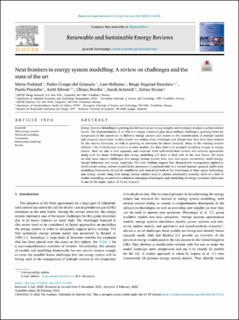| dc.contributor.author | Fodstad, Marte | |
| dc.contributor.author | Crespo del Granado, Pedro | |
| dc.contributor.author | Hellemo, Lars | |
| dc.contributor.author | Knudsen, Brage Rugstad | |
| dc.contributor.author | Pisciella, Paolo | |
| dc.contributor.author | Silvast, Antti | |
| dc.contributor.author | Bordin, Chiara | |
| dc.contributor.author | Schmidt, Sarah | |
| dc.contributor.author | Straus, Julian | |
| dc.date.accessioned | 2022-03-09T14:21:26Z | |
| dc.date.available | 2022-03-09T14:21:26Z | |
| dc.date.created | 2022-03-07T15:45:49Z | |
| dc.date.issued | 2022 | |
| dc.identifier.citation | Renewable & Sustainable Energy Reviews. 2022, 160 112246-112263. | en_US |
| dc.identifier.issn | 1364-0321 | |
| dc.identifier.uri | https://hdl.handle.net/11250/2984084 | |
| dc.description.abstract | Energy Systems Modelling is growing in relevance on providing insights and strategies to plan a carbon-neutral future. The implementation of an effective energy transition plan faces multiple challenges, spanning from the integration of the operations of different energy carriers and sectors to the consideration of multiple spatial and temporal resolutions. In this review, we outline these challenges and discuss how they have been tackled by the current literature, as well as pointing at directions for future research. Many of the existing reviews identify a list of challenges common to most models, but they tend to be grouped according to type or energy carrier. Here we take a new approach and structure both well-established models and solution approaches along with the main challenges that energy modelling will have to deal with in the near future. We focus on four main current challenges that energy system models face: time and space; uncertainty; multi-energy; energy behaviour and energy transition. The main findings suggest that: demand-side management applied to multi-carrier energy system models lacks; prosumers is explored only in a limited manner; general, multi-scale modelling frameworks should be established and considered both in the dimensions of time, space, technology and energy carrier; long term energy system models tend to address uncertainty scarcely; there is a lack of studies modelling uncertainties related to emerging technologies and; modelling of energy consumer behaviour is one of the major aspect of future research. | en_US |
| dc.language.iso | eng | en_US |
| dc.publisher | Elsevier | en_US |
| dc.rights | Navngivelse 4.0 Internasjonal | * |
| dc.rights.uri | http://creativecommons.org/licenses/by/4.0/deed.no | * |
| dc.subject | Klimaendringer | en_US |
| dc.subject | Climate change | en_US |
| dc.subject | Energisystemanalyse | en_US |
| dc.subject | Energy system analyses | en_US |
| dc.subject | Modellering av energisytemer | en_US |
| dc.subject | Energy system modeling | en_US |
| dc.title | Next frontiers in energy system modelling: A review on challenges and the state of the art | en_US |
| dc.type | Peer reviewed | en_US |
| dc.type | Journal article | en_US |
| dc.description.version | publishedVersion | en_US |
| dc.rights.holder | The Authors | en_US |
| dc.subject.nsi | VDP::Elektrotekniske fag: 540 | en_US |
| dc.subject.nsi | VDP::Electro-technical sciences: 540 | en_US |
| dc.subject.nsi | VDP::Elektrotekniske fag: 540 | en_US |
| dc.subject.nsi | VDP::Electro-technical sciences: 540 | en_US |
| dc.subject.nsi | VDP::Elektrotekniske fag: 540 | en_US |
| dc.subject.nsi | VDP::Electro-technical sciences: 540 | en_US |
| dc.subject.nsi | VDP::Elektrotekniske fag: 540 | en_US |
| dc.subject.nsi | VDP::Electro-technical sciences: 540 | en_US |
| dc.source.volume | 160 | en_US |
| dc.source.journal | Renewable & Sustainable Energy Reviews | en_US |
| dc.identifier.doi | 10.1016/j.rser.2022.112246 | |
| dc.identifier.cristin | 2008117 | |
| dc.relation.project | Norges forskningsråd: 295078 | en_US |
| dc.relation.project | Norges forskningsråd: 308811 | en_US |
| dc.source.articlenumber | 111246 | en_US |
| cristin.ispublished | true | |
| cristin.fulltext | original | |
| cristin.qualitycode | 1 | |

